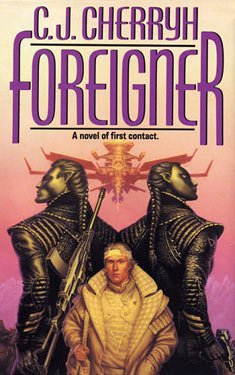C.J. Cherryh
Completed
2/8/2018, Reviewed 2/9/2018
2 stars
After reading her two Hugo winning novels, Cyteen and
Downbelow Station, I swore I’d never read another book by C.J. Cherryh. Then my book club picked one of her books for
the February selection. I swore I
wouldn’t read it. Then I got myself a
Kindle Fire tablet and the book only cost $2.99. That’s less than a Filet-o-Fish sandwich at
McDonalds. So I thought, what the hell,
I’ll be opened minded. Well, it turned
out to be another novel I didn’t like, for some of the same reasons that I
didn’t like her other books, and for some different reasons.
My first reason for not liking this book is that she uses
too much punctuation. I’ve never seen so
many dashes and ellipses in one book, except in her other books. Particularly, the use of dashes bothers
me. The dash is helpful when you want to
insert one thought in the middle of another thought. Unfortunately, when you overuse it, it simply
a terrific way to create run-on sentences.
Cherryh has run-on sentences galore.
For some authors, long sentences produces good prose. Cherryh’s sentences have too many ideas. Except when she uses sentence fragments (see
what I did there). She likes to use
sentence fragments too.
What really grinds my gears is her use of “of a sudden”
instead of “all of a sudden” or “suddenly”.
It’s like nails on a chalkboard. And
sometimes, she doesn’t include a subject in a sentence. Okay, enough of her style, let’s move on to
content.
This novel is the first of a huge series. I hoped that it would be a story that would
be compelling enough that fans (and I) would want more. Instead, she gives us a four hundred page short
story with nearly no plot, just ambiance, creating a world where next to
nothing happens. The novel is divided
into three “books”. The first book
explains how a spaceship comes out of hyperspace and the crew discovers it is
off-course and lost. They begin to look
for a habitable planet. The second book
explains how the descendants of the ship are either living on a habitable
planet, or in a space station around it.
The planet has sentient life in their steam engine age. Then, first contact happens.
All this takes up about fifty pages. Each could have been its own book. Instead Cherryh introduces a third “book”
which fast forwards to a time where all the humans now live isolated from the
native sentient life forms on an island on the planet. The only contact with the Atevi is through a
single human who can live among them as a kind of ambassador, known as a
“paidhi”, or translator. The paidhi
makes sure the Treaty that ended an early contact war between the Atevi and the
humans is held. He also makes sure that
difficult concepts are conveyed properly between the two cultures.
Bren Cameron is the paidhi.
The third book opens with an assassination attempt on Bren. Being an assassin is a highly respected
occupation and has a guild on the Atevi planet.
To safeguard Bren, he is moved to the center of the continent where he
lives with the grandmother of the head of the continent. But it is clear he is not safe there
either. So what’s going on? Who wants him dead? How does he figure this out in a culture
where terms like “friend”, “trust”, “nation”, and “border” don’t exist?
Reading back on the previous two paragraphs, I make the book
sound riveting. In reality, it is some
of the most boring text I've ever read.
The book is told from Bren’s POV.
He spends most of his time in his own head overthinking the events that
have taken place, as well as trying to second guess everyone else’s roles and
motivations. It makes for a lot of
repetitiveness. In one sense, I didn’t
mind this, because the book was so boring, I often lost my ability to
focus. Being hit over the head with the
same thoughts on the events occurring in the book over and over again, it made
sure I understood what was going on.
This is what I meant by the short story where nothing really
happens. If all we had was action,
there’s only be about fifty pages.
Instead, it’s dragged out to almost four hundred. The rest of the time we spend in Bren’s
head. On the positive side, it does help
us understand the cultural differences between humans and the Atevi, as well as
the sensitive dilemma the paidhi is in.
It does provide us with an ambiance of Cherryh’s world-building. Unfortunately, it was simply too boring for
me to care.
When the action finally started to pick up, I was well past
the over-it stage. And there really
isn’t that much action. The book ends on
a low note. I don’t see how other
readers looked forward to the next book after the drudgery of this one. I give the book two stars out of five.

No comments:
Post a Comment